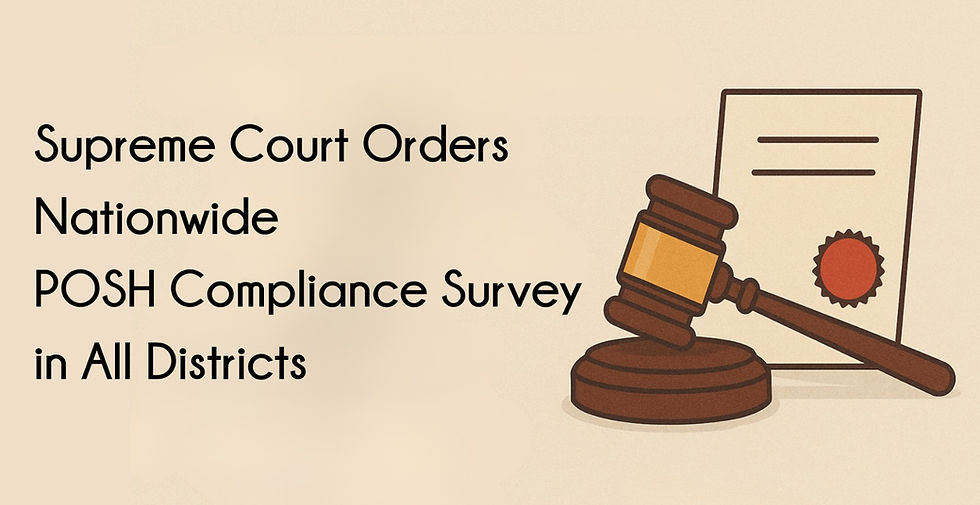Supporting Complainants Through the POSH Process
- LexPOSH

- May 21, 2025
- 3 min read

The Prevention of Sexual Harassment (POSH) Act, 2013, was established to create a safe and inclusive work environment, ensuring that every employee has access to a workplace free from sexual harassment. While the law provides a structured mechanism for addressing complaints, it is equally important to ensure that complainants are supported throughout the process. This support not only empowers individuals to come forward with confidence but also strengthens workplace policies on gender sensitivity and inclusion.
Understanding the Challenges Faced by Complainants
Complainants in POSH cases often experience significant emotional and professional stress. Fear of retaliation, social stigma, lack of trust in the redressal mechanism, and emotional trauma are common concerns. Some may hesitate to report due to concerns about career repercussions or potential alienation in the workplace. Addressing these challenges requires a robust support system that prioritizes empathy, confidentiality, and fairness.
Key Ways to Support Complainants
1. Ensuring Confidentiality
Confidentiality is a cornerstone of the POSH process. The Internal Committee (IC) must handle complaints with discretion, ensuring that details of the complaint are not disclosed to unauthorized individuals. A breach of confidentiality can discourage others from reporting incidents and can lead to further victimization of the complainant.
2. Providing Emotional Support
Filing a complaint can be an emotionally overwhelming experience. Organizations should consider offering access to counselors or employee assistance programs (EAPs) to help complainants cope with trauma. Having a trusted point of contact, such as a designated POSH officer, can also provide reassurance throughout the process.
3. Educating Employees About the POSH Process
Awareness and education play a crucial role in fostering trust in the POSH mechanism. Regular sensitization sessions can help employees understand their rights, the complaint procedure, and the protections in place for complainants. When employees are informed, they are more likely to come forward without fear.
4. Protecting Against Retaliation
Fear of retaliation is a major deterrent for complainants. Organizations must ensure that complainants do not face adverse consequences such as demotion, transfer, or termination as a result of filing a complaint. The POSH Act prohibits victimization, and it is the responsibility of the employer to create a non-threatening environment for all involved parties.
5. Conducting a Fair and Timely Inquiry
Delays in the inquiry process can cause undue stress for complainants. The IC should adhere to prescribed timelines and ensure that investigations are conducted impartially. A structured approach with regular updates to the complainant can reinforce their faith in the process.
6. Offering Workplace Accommodations
In some cases, the complainant may feel uncomfortable working in the same environment as the respondent. Temporary measures such as work-from-home options, shift changes, or temporary reassignments can be considered to ensure their well-being without penalizing their career growth.
7. Encouraging a Supportive Workplace Culture
Beyond legal compliance, organizations must foster a culture of respect and inclusivity. Encouraging open conversations, implementing gender-sensitization training, and ensuring leadership commitment to POSH compliance can help build a workplace where individuals feel safe reporting harassment.
Conclusion
Supporting complainants through the POSH process is not just about compliance with the law—it is about upholding workplace dignity, fairness, and trust. When organizations proactively address concerns, provide necessary support, and cultivate a respectful work culture, they contribute to a safer and more inclusive environment. By standing with complainants, workplaces reinforce their commitment to ensuring justice and gender equity for all employees.




